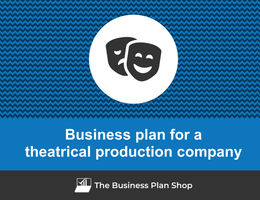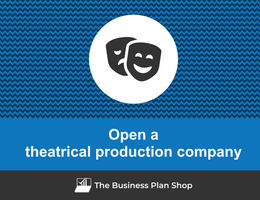How to create a financial forecast for a theatrical production company?
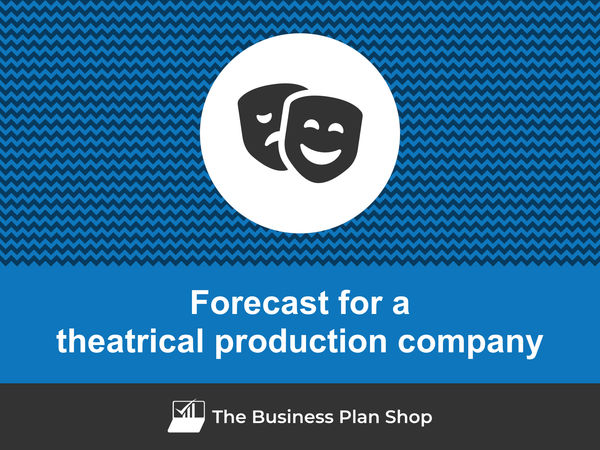
Developing and maintaining an up-to-date financial forecast for your theatrical production company is key in order to maintain visibility on your business’s future cash flows.
If you feel overwhelmed at the thought of putting together a theatrical production company financial forecast then don’t worry as this guide is here to help you.
We'll cover everything from: the main objectives of a financial forecast, the data you need to gather before starting, to the tables that compose it, and the tools that will help you create and maintain your forecast efficiently.
Let's get started!
Why create and maintain a financial forecast for a theatrical production company?
In order to prosper, your business needs to have visibility on what lies ahead and the right financial resources to grow. This is where having a financial forecast for your theatrical production company becomes handy.
Creating a theatrical production company financial forecast forces you to take stock of where your business stands and where you want it to go.
Once you have clarity on the destination, you will need to draw up a plan to get there and assess what it means in terms of future profitability and cash flows for your theatrical production company.
Having this clear plan in place will give you the confidence needed to move forward with your business’s development.
Having an up-to-date financial forecast for a theatrical production company is also useful if your trading environment worsens, as the forecast enables you to adjust to your new market conditions and anticipate any potential cash shortfall.
Finally, your theatrical production company's financial projections will also help you secure financing, as banks and investors alike will want to see accurate projections before agreeing to finance your business.
Need a convincing business plan?
The Business Plan Shop makes it easy to create a financial forecast to assess the potential profitability of your projects, and write a business plan that’ll wow investors.

What information is needed to build a theatrical production company financial forecast?
The quality of your inputs is key when it comes to financial modelling: no matter how good the model is, if your inputs are off, so will the forecast.
If you are building a financial plan to start a theatrical production company, you will need to have done your market research and have a clear picture of your sales and marketing strategies so that you can project revenues with confidence.
You will also need to have a clear idea of what resources will be required to operate the theatrical production company on a daily basis, and to have done your research with regard to the equipment needed to launch your venture (see further down this guide).
If you are creating a financial forecast of an existing theatrical production company, things are usually simpler as you will be able to use your historical accounting data as a budgeting base, and complement that with your team’s view on what lies ahead for the years to come.
Let's now zoom in on what will go in your theatrical production company's financial forecast.
The sales forecast for a theatrical production company
The sales forecast, also called topline projection, is normally where you will start when building your theatrical production company financial forecast.
Creating a coherent sales projection boils down to estimating two key drivers:
- The average price
- The number of monthly transactions
To do this, you will need to rely on historical data (for an existing business), market research data (for both new and existing theatrical production companies), and consider the elements below:
- Ticket prices: You can expect your average ticket price to fluctuate depending on the popularity and demand for your productions. For example, a highly anticipated and well-reviewed show may allow you to increase ticket prices, while a less successful show may require you to lower prices to attract audiences.
- Competition: The number and quality of other theatrical productions in your area can also impact your average ticket price. If there are many other popular shows running at the same time, you may need to offer discounted tickets or special promotions to compete and attract audiences.
- Seasonal trends: The time of year may also affect your average ticket price. For example, during the holiday season, people may be more willing to spend money on tickets for festive shows, allowing you to charge higher prices. In contrast, during slower months, you may need to adjust your prices to stay competitive and maintain audience interest.
- Touring productions: If you plan to take your productions on tour, you may need to consider the varying costs and ticket prices in different cities. For example, ticket prices in larger cities may be higher, but you may also encounter higher production costs. Planning and budgeting for these differences can help you maintain a consistent average ticket price across all locations.
- Cast and crew salaries: The salaries and wages you offer to your cast and crew can also impact your average ticket price. If you need to hire well-known and experienced actors, you may need to increase ticket prices to cover their higher salaries. Alternatively, if you are able to work with newer or less expensive talent, you may be able to offer more affordable ticket prices.
After the sales forecast comes the operating expenses budget, which we will now look into in more detail.
Need a convincing business plan?
The Business Plan Shop makes it easy to create a financial forecast to assess the potential profitability of your projects, and write a business plan that’ll wow investors.

The operating expenses for a theatrical production company
Once you know what level of sales you can expect, you can start budgeting the expenses required to operate your theatrical production company on a daily basis.
Expenses normally vary based on how much revenue you anticipate (which is why, from experience, it is always better to start your forecast with the topline projection), and where your business is based.
Operating expenses for a theatrical production company will include some of the following items:
- Staff costs: This includes the salaries and benefits of all employees, including actors, stage crew, and administrative staff.
- Accountancy fees: You will need to hire an accountant to manage your company's financial records, prepare tax returns, and provide financial advice.
- Insurance costs: It is important to have insurance coverage for your productions, including liability insurance and property insurance for equipment and sets.
- Software licenses: You may need to purchase software licenses for programs such as accounting software, graphic design software, and ticketing systems.
- Banking fees: You may incur fees for maintaining a business bank account, making transactions, and using credit card processing services.
- Venue rental: This includes the cost of renting a performance venue, which can vary depending on the size, location, and availability of the space.
- Set and costume design: You will need to budget for the design and construction of sets and costumes for each production.
- Marketing and advertising: It is important to promote your productions through various channels, such as print ads, online ads, and social media.
- Travel expenses: If your company tours or participates in festivals, you will need to budget for travel expenses such as airfare, lodging, and meals.
- Royalties and licensing fees: You may need to pay royalties and licensing fees for performing copyrighted material or using licensed material in your productions.
- Equipment rental: You may need to rent equipment such as lighting, sound, and special effects equipment for each production.
- Professional development: It is important to invest in the professional development of your staff, including training, workshops, and conferences.
- Legal fees: You may need to hire a lawyer to review contracts, handle disputes, and provide legal advice for your company.
- Office supplies and utilities: You will need to budget for basic office supplies such as paper, ink, and pens, as well as utilities such as electricity and internet.
- Performance rights: If you plan on performing a play or musical, you will need to obtain performance rights and pay any associated fees.
This list will need to be tailored to the specificities of your theatrical production company, but should offer a good starting point for your budget.
What investments are needed to start or grow a theatrical production company?
Once you have an idea of how much sales you could achieve and what it will cost to run your theatrical production company, it is time to look into the equipment required to launch or expand the activity.
For a theatrical production company, capital expenditures and initial working capital items could include:
- Theatre space: This includes the cost of renting or purchasing a performance space, as well as any necessary renovations or improvements to make it suitable for theatrical productions. This can also include the cost of equipment such as lighting and sound systems.
- Set and prop construction: Theatrical productions often require elaborate sets and props, which may need to be custom built or purchased. This can include materials, labor, and any necessary tools or equipment.
- Costumes and wardrobe: Productions may require a variety of costumes and wardrobe for actors, which can range from simple to elaborate designs. This can include the cost of fabric, materials, and labor for creating or purchasing costumes.
- Equipment and instruments: Depending on the type of production, a theatrical company may need to purchase or rent specialized equipment and instruments. This can include things like microphones, instruments, and other technical equipment.
- Marketing and advertising materials: While marketing and advertising are typically considered operating expenses, a theatrical production company may also have capital expenditures for things like posters, flyers, and other promotional materials that can be used for multiple productions.
Again, this list will need to be adjusted according to the specificities of your theatrical production company.
Need a convincing business plan?
The Business Plan Shop makes it easy to create a financial forecast to assess the potential profitability of your projects, and write a business plan that’ll wow investors.

The financing plan of your theatrical production company
The next step in the creation of your financial forecast for your theatrical production company is to think about how you might finance your business.
You will have to assess how much capital will come from shareholders (equity) and how much can be secured through banks.
Bank loans will have to be modelled so that you can separate the interest expenses from the repayments of principal, and include all this data in your forecast.
Issuing share capital and obtaining a bank loan are two of the most common ways that entrepreneurs finance their businesses.
What tables compose the financial plan for a theatrical production company?
Now let's have a look at the main output tables of your theatrical production company's financial forecast.
The projected profit & loss statement
The projected profit & loss shows how profitable your theatrical production company is likely to be in the years to come.
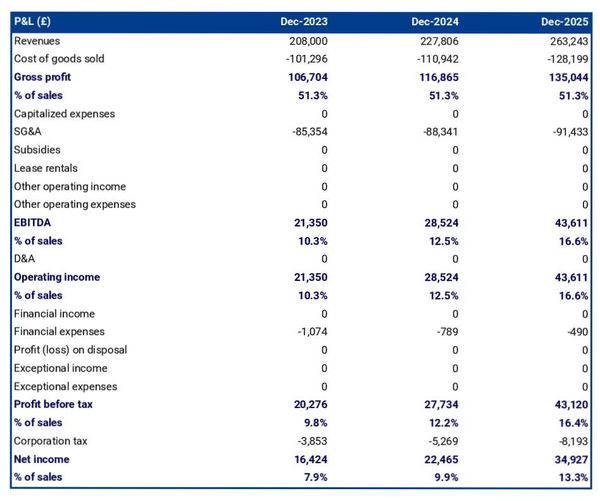
For your theatrical production company to be financially viable, your projected P&L should ideally show:
- Sales growing above inflation (the higher the better)
- Profit margins which are stable or expanding (the higher the better)
- A net profit at the end of each financial year (the higher the better)
This is for established theatrical production companies, there is some leniency for startups which will have numbers that will look a bit different than existing businesses.
The projected balance sheet
Your theatrical production company's forecasted balance sheet enables you to assess your financial structure and working capital requirements.
It is composed of three types of elements: assets, liabilities and equity:
- Assets: represent what the business owns and uses to produce cash flows. It includes resources such as cash, equipment, and accounts receivable (money owed by clients).
- Liabilities: represent funds advanced to the business by lenders and other creditors. It includes items such as accounts payable (money owed to suppliers), taxes due and loans.
- Equity: is the combination of what has been invested by the business owners and the cumulative profits and losses generated by the business to date (which are called retained earnings). Equity is a proxy for the value of the owner's stake in the business.
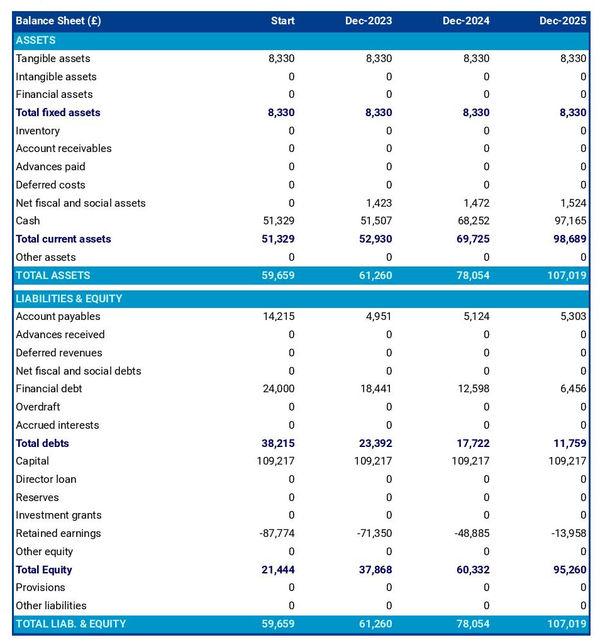
The projected cash flow statement
A projected cash flow statement for a theatrical production company is used to show how much cash the business is generating or consuming.
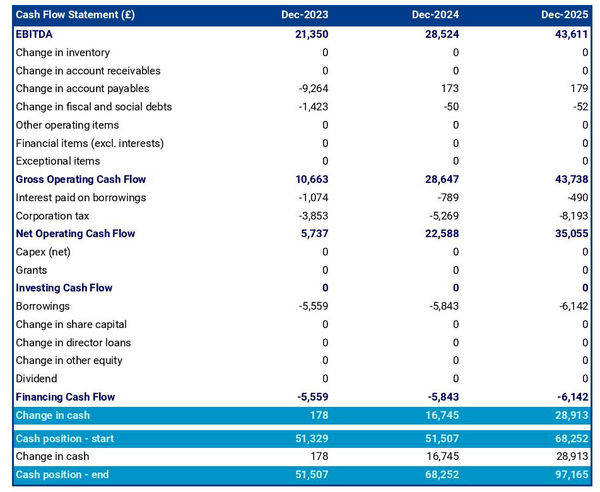
The cash flow forecast is usually organised by nature to show three key metrics:
- The operating cash flow: do the core business activities generate or consume cash?
- The investing cash flow: how much is the business investing in long-term assets (this is usually compared to the level of fixed assets on the balance sheet to assess whether the business is regularly maintaining and renewing its equipment)?
- The financing cash flow: is the business raising new financing or repaying financiers (debt repayment, dividends)?
Cash is king and keeping an eye on future cash flows is imperative for running a successful business. Therefore, you should pay close attention to your theatrical production company's cash flow forecast.
If you are trying to secure financing, note that it is customary to provide both yearly and monthly cash flow forecasts in a financial plan - so that the reader can analyze seasonal variation and ensure the theatrical production company is appropriately capitalised.
Need a convincing business plan?
The Business Plan Shop makes it easy to create a financial forecast to assess the potential profitability of your projects, and write a business plan that’ll wow investors.

Which tool should you use to create your theatrical production company's financial projections?
Building a theatrical production company financial forecast is not difficult provided that you use the right tool for the job. Let’s see what options are available below.
Using online financial forecasting software to build your theatrical production company's projections
The modern and easiest way is to use professional online financial forecasting software such as the one we offer at The Business Plan Shop.
There are several advantages to using specialised software:
- You can easily create your financial forecast by letting the software take care of the financial calculations for you without errors
- You have access to complete financial forecast templates
- You get a complete financial forecast ready to be sent to your bank or investors
- You can easily track your actual financial performance against your financial forecast, and recalibrate your forecast as the year goes by
- You can create scenarios to stress test your forecast's main assumptions
- You can easily update your forecast as time goes by to maintain visibility on future cash flows
- You have a friendly support team on standby to assist you when you are stuck
- It’s cost-efficient and much cheaper than using an accountant or consultant (see below)
If you are interested in this type of solution, you can try our forecasting software for free by signing up here.
Hiring a financial consultant or chartered accountant
Hiring a consultant or chartered accountant is also an efficient way to get a professional theatrical production company financial projection.
As you can imagine, this solution is much more expensive than using software. From experience, the creation of a simple financial forecast over three years (including a balance sheet, income statement, and cash flow statement) is likely to start around £700 or $1,000 excluding taxes.
The indicative estimate above, is for a small business, and a forecast done as a one-off. Using a financial consultant or accountant to track your actuals vs. forecast and to keep your financial forecast up to date on a monthly or quarterly basis will naturally cost a lot more.
If you choose this solution, make sure your service provider has first-hand experience in your industry, so that they may challenge your assumptions and offer insights (as opposed to just taking your figures at face value to create the forecast’s financial statements).
Why not use a spreadsheet such as Excel or Google Sheets to build your theatrical production company's financial forecast?
Creating an accurate and error-free theatrical production company financial forecast with a spreadsheet is very technical and requires a deep knowledge of accounting and an understanding of financial modelling.
Very few business owners are financially savvy enough to be able to build a forecast themselves on Excel without making mistakes.
Lenders and investors know this, which is why forecasts created on Excel by the business owner are often frowned upon.
Having numbers one can trust is key when it comes to financial forecasting and to that end using software is much safer.
Using financial forecasting software is also faster than using a spreadsheet, and, with the rise of artificial intelligence, software is also becoming smarter at helping us analyse the numbers to make smarter decisions.
Finally, like everything with spreadsheets, tracking actuals vs. forecasts and keeping your projections up to date as the year progresses is manual, tedious, and error-prone. Whereas financial projection software like The Business Plan Shop is built for this.
Need a convincing business plan?
The Business Plan Shop makes it easy to create a financial forecast to assess the potential profitability of your projects, and write a business plan that’ll wow investors.

Use our financial forecast templates for inspiration
The Business Plan Shop has dozens of financial forecast examples available.
Our templates contain both a financial forecast and a written business plan which presents, in detail, the company, the team, the strategy, and the medium-term objectives.
Our templates are a great source of inspiration, whether you just want to see what a complete business plan looks like, or are looking for concrete examples of how you should model financial elements in your own forecast.
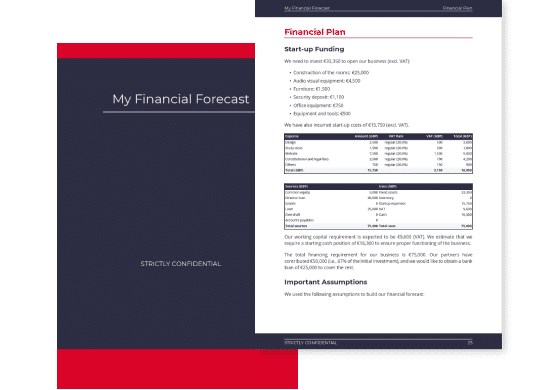
Takeaways
- Having a financial forecast enables you to visualise the expected growth, profitability, and cash generation for your business over the next three to five years.
- Tracking actuals vs. forecast and keeping your financial projections up-to-date is the only way to get a view on what your theatrical production company future cash flows may look like.
- Using financial forecasting software is the mordern and easy way to create and maintain your forecasts.
This is the end of our guide on how to build the financial forecast for a theatrical production company, we hope you found it useful. Don't hesitate to contact us if you want to share your feedback or have any questions.
Need a convincing business plan?
The Business Plan Shop makes it easy to create a financial forecast to assess the potential profitability of your projects, and write a business plan that’ll wow investors.

Also on The Business Plan Shop
- Example of financial forecast
- Financial forecast for a business idea
- How to project revenues for a business?
Know someone who owns or is thinking of starting a theatrical production company? Share our forecasting guide with them!


